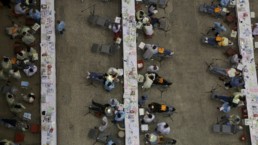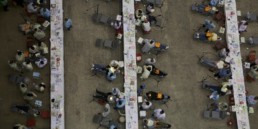Farihah Zaman, Jeff Reichert on ‘Remote Area Medical’
"You have to show that charity is not a viable substitute for a functional healthcare system." -Farihah Zaman
It’s kind of ironic, I had to take my boyfriend to the hospital Tuesday night, right in the middle of watching this film, and so I watched the second half of the film from a hospital waiting room. It’s not that I could relate better to the people in Remote Area Medical after having to wait six hours to be seen by a doctor, but it made me appreciate healthcare in general so much more. Remote Area Medical tells the story of the organization whose mission is to help those who cannot afford to visit the doctor or dentist. Directors Farihah Zaman and Jeff Reichert execute a powerful film that shows both the overwhelming amount of people who need help, all the while keeping their stories intimate. In our exclusive interview, I talk to Farihah and Jeff about their experience making Remote Area Medical. We begin:
CAN YOU DESCRIBE THE ENVIRONMENT AT THE ARENA? IT LOOKS LIKE COACHELLA FROM THE OUTSIDE- PEOPLE ARE CAMPING IN TENTS AND CARS.
FARIHAH ZAMAN: It is utterly overwhelming, particularly because of the venue. You’re in a NASCAR speedway which is like a palace to recreational glamour, and here are people camping out, desperate for healthcare. That irony is never lost on you when you’re there. Even before we started filming, when we volunteered, there was also some good humor. One of the important things we learned in making the film is that people are not just a summary of their worst problems. That Coachella reference is kind of funny, but kind of true- people were tailgating, flipping burgers, and playing card games. To see that camaraderie tells you a lot about the community in addition to just the need that’s there.
DID YOU FIND IT DIFFICULT TO GET PEOPLE TO TALK TO YOU?
JEFF REICHERT: If we as filmmakers try to be really careful about checking out a situation first, not just running up to people. When we saw people we though were interesting, we would put the camera down and walk up to them, like ‘Hi I’m Jeff and this is what we’re doing.’ Once people realized we were there not to just get pictures of poor people waiting in line for care, and that we were interested in them beyond their health problems… we had almost no problems getting people to talk to us and open up. We talked to them about their jobs, their work, what they were like as teenagers, how the met their spouse, etc.
THERE IS ONE MOMENT IN THE FILM THAT’S A LITTLE UNCOMFORTABLE- A GIRL IS TRYING TO GET A NUMBER AND LIES TO A R.A.M. VOLUNTEER. DID YOU ENCOUNTER FEELINGS OF UNCOMFORTABLENESS WHILE SHOOTING?
FZ: I was reminded repeatedly throughout the shooting experience that this is what people have to do to go see the doctor. It’s not right. What I found upsetting, but also interesting about that moment in the film you’re talking about is that you have compassion for every single person involved. I definitely didn’t envy (R.A.M. volunteer) Theresa who has to hand out the last ticket or tell somebody they’re not getting in. I feel for that girl because even though she tried to cheat the system, if you were in her position maybe you would do the same thing. I mean, I think I might.
Once people realized we were there not to just get pictures of poor people waiting in line for care, and that we were interested in them beyond their health problems… we had almost no problems getting people to talk to us and open up.
IT’S GREAT THAT YOU BROUGHT REMOTE AREA MEDICAL TO OUR ATTENTION WITH THIS FILM- I PERSONALLY DIDN’T KNOW IT EXISTED. WHEN DID YOU BOTH BECOME AWARE OF R.A.M.?
JR: It was in 2010 when we first heard about the organization through my Aunt, a retired nurse. She saw a special on 60 Minutes and she felt completely compelled to volunteer at a clinic in Tennessee. When she came back home (to New Jersey), she said it was the highlight of her nursing career. She said everybody, medical professional or not, should go and help out. [Farihah and I] went down to a clinic in Kentucky in 2011, and we got the bug there. Seeing all the good that people can do, we though, ‘Oh there is a movie in this.’
THE SENSE OF TOGETHERNESS AND COMMUNITY IS SO STRONG IN THIS FILM, WHAT WAS YOUR EXPERIENCE LIKE?
FZ: Because of the small budget, the crew stayed in a vacation rental nearby in Tennessee. We had twenty people in one house! Jeff’s cousin came out and would make dinner for the crew every night because we thought that would be more comforting in a way. We put up a lot of organizational systems that mostly worked, shockingly…haha. We also had to be open to the idea that they might break down at times. We had to just roll with the punches because there is so much happening at any given time. In the end, I think we’re really glad we made it the way we did, especially because the film ended up being so much about community. One of the things we really loved about R.A.M. is that they don’t just come in, pour some money into the community, and then leave; Not only do they provide these services, you really see people band together and that was even more powerful.
JR: Yeah, I think the hardest part was convincing Remote Area Medical that we could do this movie, without jeopardizing their mission. They’re very sensitive about being criticized in any way, shape or form. We emailed the general email address [about wanting to make this film] and [founder] Stan Brock emailed us back 20 minutes later like, ‘No way, no how, we’re not going to let you do this.’ The whole next year was spent talking to them and explaining to them what it might look like, who we were, what our background was. It wasn’t even until a couple months before we were planning to shoot that we actually got the final OK.
HAVE THE PEOPLE AT REMOTE AREA MEDICAL SEEN THE FILM?
FZ: They have, we’ve maintained a good relationship with them. Stan has tried to come and do press whenever possible, even though they have a very rigorous schedule. We really appreciate their support, given the fact that we don’t hide the flaws of the organization. You have to show that charity is not a viable substitute for a functional healthcare system.
YOUR DECISION TO GO WITH COMPOSER DAVID WINGO WAS AWESOME, I LOVE HIS WORK.
JR: David is actually an old friend, he did the music for my first feature, Gerrymandering, where we settled on this idea of having him do various covers of American patriotic anthems. For this film, he wanted to think about Appalachian music. Where we filmed is the birthplace of country music, and we wanted that reference in the movie as well.
FZ: And actually if you’re curious, the models you see in the end credits- there’s a Country and Bluegrass Music Museum in the Bristol, TN mall and it’s amazing. They have all this incredible history that’s just casually put out in this tiny place. There was a scale model of the town of Bristol in this museum, and that’s what we ended up filming.
Morgan Rojas
Certified fresh. For disclosure purposes, Morgan currently runs PR at PRETTYBIRD and Ventureland.




Pretty darn interesting interview. I have this coming from the local library and really look forward to watching it.